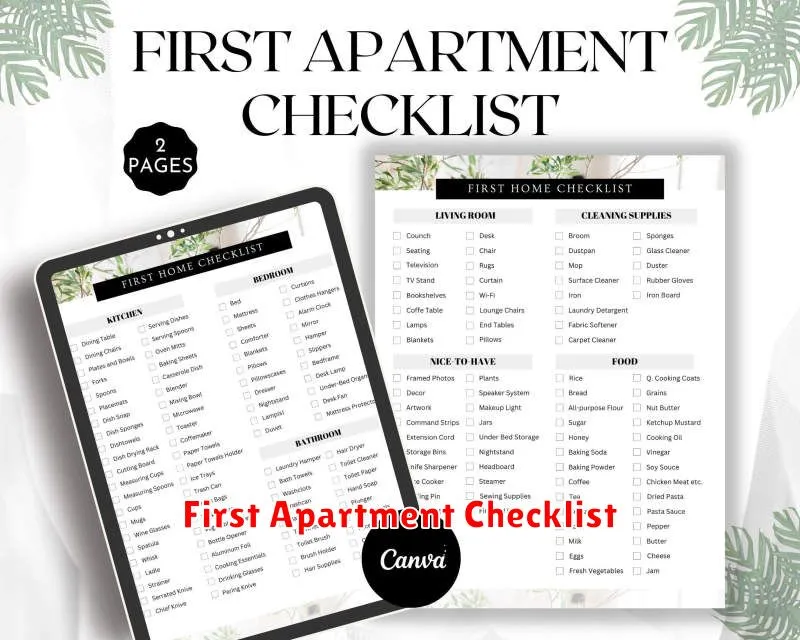Moving into your first apartment is an exciting milestone! It’s a chance to create your own space and experience a new level of independence. But with excitement comes a lot of questions. What are the essential tips for first-time apartment renters? From finding the perfect place to budgeting and understanding your rights, we’ve got you covered. Read on to learn valuable insights that will make your first apartment experience smooth and stress-free.
Setting a Realistic Budget for Your First Apartment
Before you even start browsing apartments, it’s crucial to set a realistic budget for your first apartment. Take a close look at your income and expenses, and determine how much you can comfortably afford to spend each month. Remember, rent is just one part of your housing costs.
Consider these factors when budgeting:
- Rent: Aim to spend no more than 30% of your gross monthly income on rent.
- Utilities: Factor in the cost of electricity, gas, water, trash, and internet.
- Security Deposit: Most landlords require a security deposit equal to one or two months’ rent.
- Other Expenses: Don’t forget about potential moving expenses, renter’s insurance, and any pet fees or deposits.
A realistic budget will prevent financial stress and help you find an apartment you can comfortably afford in the long run.
Exploring Different Neighborhoods and Their Amenities
Before you start searching for apartments, it’s crucial to explore different neighborhoods and consider what amenities are important to you. Every neighborhood has its own unique vibe, so take some time to walk around, observe the surroundings, and imagine yourself living there. Some key factors to consider include:
- Proximity to your workplace or school: Commuting time is a significant factor in your daily life. Consider how long it would take you to reach your destination during peak hours and the cost of transportation.
- Access to public transportation: If you don’t own a car, it’s essential to choose a neighborhood with convenient public transportation options, like bus routes or subway lines.
- Safety and security: Check the crime rate and explore the neighborhood during different times of the day to assess your comfort level.
- Availability of amenities: Consider the proximity to grocery stores, restaurants, parks, libraries, and other amenities that are essential to your lifestyle.
- Overall atmosphere: Choose a neighborhood that matches your personality and lifestyle. Do you prefer a quiet and peaceful environment or a lively and vibrant one?
By exploring different neighborhoods and considering their amenities, you can find the perfect place that meets your needs and preferences. Don’t hesitate to ask locals about their experiences or check online reviews to get a better understanding of the neighborhood.
Understanding Lease Agreements and Your Rights as a Tenant
As a first-time apartment renter, understanding your lease agreement is crucial. It outlines your rights and responsibilities as a tenant and the landlord’s obligations. Carefully review the document and make sure you understand all the terms and conditions before signing it.
Pay attention to the lease duration, rent amount, payment schedule, and late fees. You should also be aware of the security deposit, pet policies, and any restrictions on subletting.
Remember, the lease agreement is a legally binding contract. If you have any questions or concerns, don’t hesitate to ask your landlord or a legal professional for clarification.
It’s important to be familiar with your basic tenant rights, which vary depending on the state. Generally, tenants have the right to:
- Live in a safe and habitable dwelling
- Enjoy reasonable privacy within their unit
- Be free from unreasonable noise and disturbance
- Receive notice before entry by the landlord
- Have their security deposit returned upon move-out, minus any applicable deductions for damage or unpaid rent
Knowing your rights will empower you to effectively communicate with your landlord and address any concerns or issues that may arise during your tenancy.
Conducting a Thorough Apartment Inspection Before Signing
Before you sign on the dotted line for your new apartment, it’s crucial to conduct a comprehensive inspection. This will ensure that the unit meets your expectations and that you aren’t inheriting any pre-existing issues. Here’s a step-by-step guide to help you:
1. Take Your Time: Don’t rush through the inspection. Schedule ample time to go through every room, corner, and nook.
2. Bring a Checklist: Create a checklist of items to inspect, including appliances, plumbing, electrical outlets, windows, doors, and flooring.
3. Check for Functionality: Test all appliances (stove, oven, refrigerator, dishwasher, etc.) to ensure they are in working order. Turn on the water and check for leaks or low water pressure.
4. Examine the Condition: Look for any signs of damage, including cracks in walls, peeling paint, water stains, or holes. Note the condition of the flooring, countertops, and fixtures.
5. Check the Windows and Doors: Ensure windows and doors open and close properly, and check for any drafts or leaks.
6. Inspect the Electrical System: Test all outlets and light fixtures. Make sure the electrical panel is accessible.
7. Evaluate the Heating and Cooling System: Turn on the heating and cooling systems to confirm they work properly. Note the temperature settings and any unusual noises.
8. Examine the Smoke Detectors and Carbon Monoxide Detectors: Verify that they are in place and working.
9. Check for Pests: Look for signs of pests, such as droppings, tracks, or nests.
10. Document Everything: Take photos or videos of any issues or concerns you discover. It’s always best to have documentation to support your claims.
11. Don’t Be Afraid to Ask Questions: If you have any questions about the unit, don’t hesitate to ask the landlord or property manager.
12. Include Any Concerns in Your Lease: Before signing the lease, make sure to note any existing issues or concerns you have. This will protect you in case of any future disputes.
By conducting a thorough inspection, you can ensure that your new apartment meets your needs and that you aren’t responsible for pre-existing issues. This will help you start your tenancy on the right foot!
Creating a Comprehensive Apartment Checklist
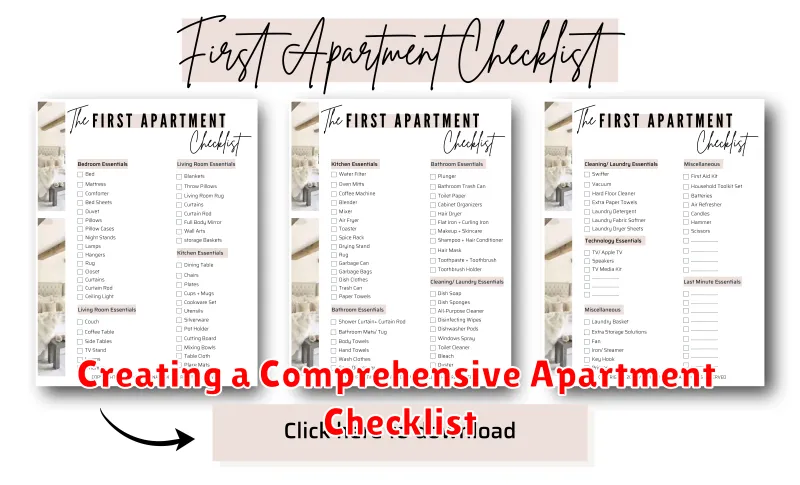
Moving into your first apartment can be an exciting and overwhelming experience. To ensure a smooth transition and avoid any potential issues, creating a comprehensive checklist is crucial. This checklist should cover everything from essential appliances and fixtures to safety and maintenance considerations.
Here are some key areas to include in your checklist:
- Appliances: Verify that all appliances, including the stove, refrigerator, oven, dishwasher, and microwave, are in good working order. Check for any dents, scratches, or malfunctions.
- Fixtures: Inspect all fixtures, such as faucets, light switches, and door handles, for proper functioning and any signs of damage.
- Heating and Cooling: Ensure that the heating and cooling systems are operational and in good condition. Test the thermostat and check for any leaks or unusual noises.
- Plumbing: Run the water in all sinks and tubs to check for leaks or low water pressure. Inspect the toilet for proper flushing and any signs of leakage.
- Electrical: Test all outlets and light fixtures to make sure they are working. Pay attention to any flickering lights or loose wires.
- Safety: Check for working smoke detectors and carbon monoxide detectors. Inspect the windows and doors for proper locks and security.
- Maintenance: Ask about the maintenance procedures and response time for any issues that may arise. Discuss any existing maintenance requests or repairs.
- Storage: Determine if there is adequate storage space for your belongings. Check for any leaks or damage in the storage area.
- Pest Control: Inquire about the apartment’s pest control protocols and any history of infestations. Check for any signs of pests.
- Noise Level: Assess the noise level of the apartment and surrounding neighborhood. Consider the proximity to busy streets or other potential noise sources.
By creating a comprehensive checklist and meticulously reviewing each item, you can ensure a safe, comfortable, and hassle-free move-in experience.
Essential Documents and Information to Have Ready for Applications
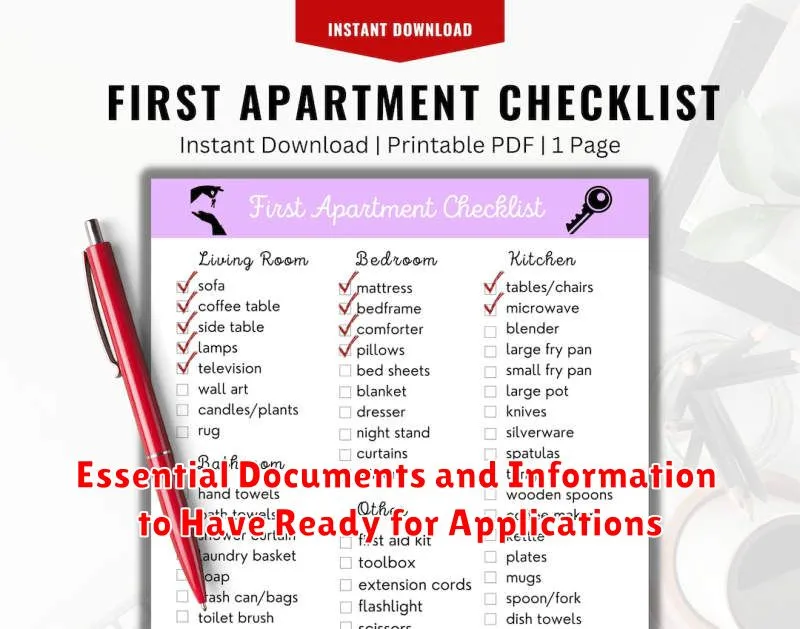
The apartment application process can be a bit daunting, especially for first-time renters. One way to ease the process is to gather all of your essential documents and information beforehand. This will help you move swiftly through the application process. Here are some important documents and information you’ll need:
- Photo identification: You’ll need a valid driver’s license, passport, or state ID to prove your identity.
- Social Security number: This is used for background checks and credit history.
- Proof of income: This can be in the form of pay stubs, bank statements, or a letter of employment. The landlord will want to ensure you can afford rent.
- Credit report: Landlords may request a credit report to see how responsible you are with finances.
- References: Gather contact information for previous landlords or employers. This will help the landlord verify your history.
- Pet information: If you have pets, be sure to have their vaccination records and any other relevant information ready. Not all apartments accept pets.
- Co-signer information: If you’re using a co-signer, have their documents and information ready as well. This can help you qualify for an apartment if you have limited credit history.
Having these documents and information readily available will make the application process much smoother and more efficient. It demonstrates your preparedness and seriousness about renting an apartment.
Tips for Negotiating Rent and Other Lease Terms
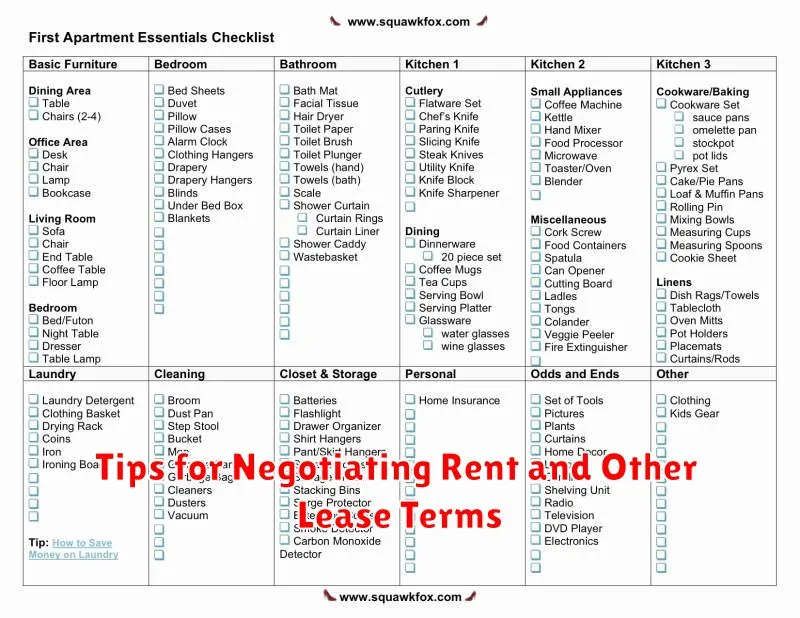
Negotiating rent and lease terms can feel daunting, especially for first-time renters. However, it’s worth exploring your options to secure a favorable deal. Remember, landlords are often open to negotiation, especially in competitive markets.
Here are some strategies to consider:
Research the Market
Before you begin any negotiations, research the market to understand average rent prices for similar apartments in the area. Websites like Zillow, Apartments.com, and Trulia can provide valuable insights.
Focus on Value
Highlight any unique features or benefits that your apartment offers, such as extra storage space, in-unit laundry, or a desirable location. Emphasize these features and their value to justify your desired rent or concessions.
Timing is Key
The best time to negotiate is typically when the market is slow or during the off-season for rentals. Landlords are more likely to be flexible when they have vacancies to fill.
Be Prepared to Walk Away
A strong negotiating position is to be prepared to walk away if the landlord is unwilling to compromise. This shows your commitment to finding the right place and can encourage them to reconsider their offer.
Negotiate Other Lease Terms
Don’t limit your negotiation to just rent. You can also discuss other lease terms, such as:
- Lease duration: Negotiate a shorter lease term if you’re unsure about staying for the full term.
- Security deposit: Explore options to reduce the security deposit or have it returned sooner after your lease ends.
- Pet deposit: If you have a pet, negotiate a lower pet deposit or discuss waiving it altogether.
- Early termination clause: Try to include a clause that allows you to break the lease under certain circumstances, such as a job relocation.
Be Polite and Professional
Maintain a respectful and professional demeanor throughout the negotiation process. This will help you build a positive relationship with the landlord and increase your chances of securing a favorable deal.
Get It in Writing
Once you reach an agreement, make sure to get it in writing. This will prevent any misunderstandings or disputes in the future.
Securing Renters Insurance: Protecting Your Belongings
Moving into your first apartment is an exciting milestone, but it’s also important to be prepared for the unexpected. One essential step to safeguard your belongings is securing renters insurance. Renters insurance offers crucial protection for your personal possessions against various perils, such as theft, fire, and natural disasters.
When choosing renters insurance, consider factors like coverage limits, deductibles, and the cost of premiums. Coverage limits determine the maximum amount your insurer will pay for covered losses, while deductibles represent the amount you pay out-of-pocket before your insurance kicks in. It’s vital to select coverage that aligns with the value of your belongings and your financial situation.
While it’s a wise investment, renters insurance often doesn’t cover everything. Be sure to understand the policy’s exclusions, such as damage caused by negligence or specific types of disasters. You can request add-ons or endorsements to tailor your policy to your individual needs, such as coverage for valuable items or liability protection.
Securing renters insurance provides peace of mind knowing you have financial protection against unexpected events. It’s a small investment that can have a significant impact in protecting your belongings and safeguarding your financial well-being in the event of an unforeseen incident.
Moving in and Setting Up Utilities in Your New Apartment
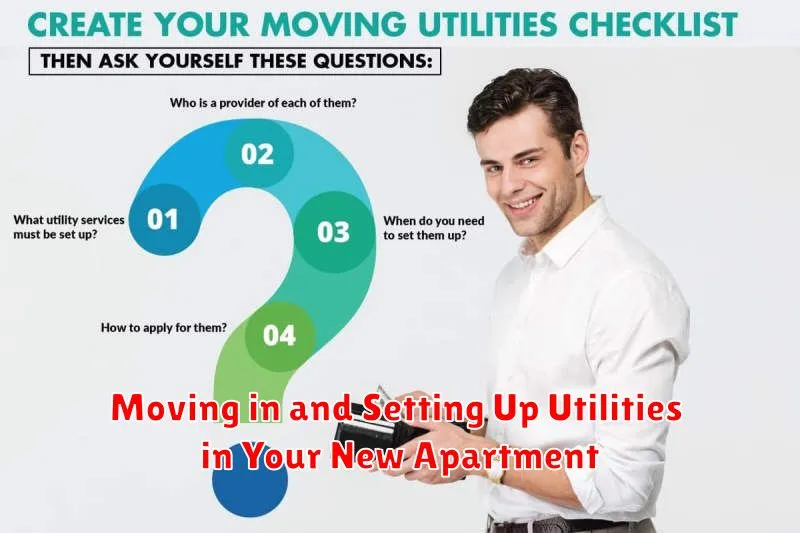
Moving into your first apartment is an exciting milestone! But before you unpack your boxes and settle in, there are a few essential tasks to take care of: setting up your utilities. This ensures you have access to electricity, gas, water, and internet from the moment you move in.
The first step is to contact the utility companies that serve your new apartment. You can usually find this information in your lease agreement or by asking your landlord. Get in touch with each company to set up an account and schedule a start date for service.
It’s a good idea to gather the following information before you call:
- Your full name and contact information
- Your lease start date
- The apartment’s address and unit number
- Your previous address (if applicable)
- Your preferred method of payment
Make sure to confirm the start date for your utilities and keep track of any fees or deposits required. You may also want to inquire about potential discounts or promotions available for new customers. Once your utilities are set up, you can relax and enjoy your new home!
Building a Positive Relationship with Your Landlord
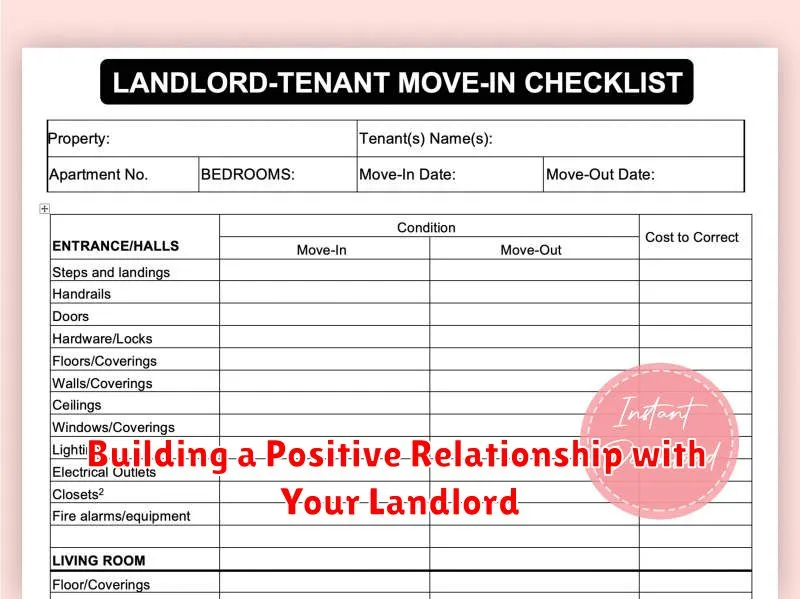
Your landlord is the person who owns your apartment building and is responsible for its upkeep. While you may not need to be best friends with your landlord, it’s important to build a positive relationship. A good relationship can help prevent any issues from escalating and make dealing with necessary repairs much easier. Here are a few tips to foster a positive relationship with your landlord:
Communicate clearly and respectfully. If you have any questions or concerns, reach out to your landlord in a timely manner. Be respectful of their time and be prepared to explain your issue clearly.
Be a responsible tenant. Pay your rent on time and follow the terms of your lease agreement. This includes keeping your apartment clean and respecting the quiet hours outlined in your lease. Being a responsible tenant shows your landlord that you’re reliable and trustworthy.
Take initiative. Don’t wait for your landlord to handle every little thing. If you notice a small repair, try to address it yourself before it becomes a bigger problem. Even if you don’t do the repair yourself, take the initiative to inform your landlord of the issue and offer to help with the fix.
Be proactive. Even if everything is going smoothly, reach out to your landlord periodically just to check in and show that you’re a conscientious tenant. A simple email or phone call can help to ensure that the lines of communication remain open and that you’re on good terms.
By following these tips, you can build a positive relationship with your landlord, making your time in your new apartment a much more pleasant experience.

